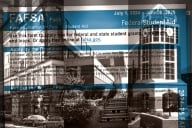You have /5 articles left.
Sign up for a free account or log in.
Edwin H. Welch, president of the University of Charleston, is investigating the legal ramifications of an advertisement that states that applicants must believe in God -- an apparent violation of federal anti-bias laws.
The ad for the West Virginia institution, which first appeared Monday, lists a position called the Herchiel and Elizabeth Sims “In God We Trust” Chair in Ethics. The job would require a candidate to teach ethics-related courses, and “work with communities on and outside of campus to enhance the university’s reputation as a center for ethical and moral thought, and to encourage the use of ethical practices among members of the communities.”
The ad says that prospective candidates must have earned a doctorate and expertise in ethics, have had faculty development experience and “must embrace a belief in God and present moral and ethical values from a God-centered perspective.” The unusual job requirement was noted on Brian Leiter's blog.
The contact person listed in the ad, J. Wayne Jones, chair of the university’s Morris Harvey Division of Arts and Sciences, did not return repeated phone calls and e-mail messages on Tuesday and when reached Tuesday night said he would only talk during business hours. The person listed on the university’s Web site as currently holding the position, Harold H.S. Oh, also did not respond to calls and e-mail messages.
A university spokesman, Andy Spradling, said that Welch has contacted university counsel regarding the matter. Welch confirmed that a university official had posted the job ad.
As a private, non-religious institution, the university must conform to Title VII of the Civil Rights Act, which says that an employer may not “fail or refuse to hire or to discharge any individual, or otherwise to discriminate against any individual with respect to his compensation, terms, conditions, or privileges of employment, because of such individual's race, color, religion, sex, or national origin,” according to legal scholars. Religious institutions, in contrast, have leeway to include religious tests for employment in many circumstances.
According to the university’s Web site, the institution “does not discriminate on the basis of race, color, sex, religion, handicap, age or national or ethnic origin in the administration of its educational policies, admission policies, scholarship and loan programs, athletic activities or other school-administered programs.”
Several legal experts say that the job posting would indicate that the university is not only breaking its own rules, but also the law.
“For a private, non-religious employer to require a belief in God would seem to violate the statute,” said Ian Ayres, a professor at Yale Law School and expert on civil rights.
“I think that this would violate Title VII of the 1964 Civil Rights with regard to religious discrimination in employment,” said Erwin Chemerinsky, a law professor at Duke University and expert on constitutional law. “The description is that ‘candidates must embrace a belief in God and present moral and ethical values from a God-centered perspective.’ I would say that this clearly violates Title VII as religious discrimination in employment.”








